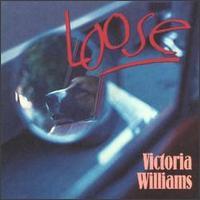
- Format: FLAC

Sometimes one has to wonder just where great records come from; when something comes out of the factory spotless, full of brightness, life and love, grit and suffering, all offered as a gift to the listener. Loose is Victoria Williams' comeback record after her two amazing but misunderstood Geffen records, Happy Come Home and Swing the Statue!. In the interim she was diagnosed with multiple sclerosis and had no health insurance. The Sweet Relief Foundation was set up and helped to take care of her — and other uninsured musicians' — expenses and restore her health. Loose is the evidence of that health and the final proof for all the naysayers that Williams is among the most gifted singers and songwriters of her generation. With a cast of musicians that includes the Jayhawks, Van Dyke Parks, the Tower of Power Horns, Tammy Rodgers, Dave Pirner, Greg Leisz, Don Heffington, Doug Wieselman, and a ton of others, the music ranges from the blue-eyed R&B of "You R Loved," with its punchy horns and passionate declaration of redemption, to the jazzy Ben Sidran-esque "Harry Went to Heaven," to the beautiful country duet "When We Sing Together" between Williams and soon-to-be husband Mark Olson that comes across as a Gram Parsons/Emmylou Harris duet. There is joy and more joy in the proceedings. But it is more than that. Inside the sound of Williams' unusual yet glorious voice is the sound of gratitude. In the musical accompaniment there is an excitement that something is unfolding here that will perhaps never be experienced again, that music is being made without ego, showcases, excesses, or even specific direction. Everything is spontaneously created and then disciplined in its final execution. Check out the loopy off-the-beat "Polish Those Shoes" with its orchestral accompaniment behind the beat of the rock band. Then there's Williams' absolutely astonishing read of "What a Wonderful World." Like Louis Armstrong's — and this is not a comparison between versions but a likeness of emotional transference — Williams expresses not only wonder but folksy wisdom in each line. Likewise, so does the cover of Spirit's "Nature's Way," a duet with Soul Asylum's Dave Pirner. The feeling is almost prayer-like, but it's a prayer of acceptance rather than one of supplication. But it is in Williams' own songs that the truth of her accomplishment lies, such as "Sunmshine Country," organic yet psychedelic yet as hooky as any fine pop song, the loopy "Happy to Have Known Pappy," the tender folk song "My Ally," the shambolic rock & roll of "Get Away," and the concluding gospel track, "Psalms," which with its tenderness and reverence, expresses a simple faith and profound dedication. Paul Fox's production is ingenious, culling virtually anything he could afford to make each song a piece in a lush yet easily accessible tapestry of texture, ambience, and pop majesty. This is a comeback record that brought an artist back into the public eye — however briefly — and created a masterpiece that transcends genre by blurring all the lines in the name of excellence, emotional honesty, and visionary creativity.